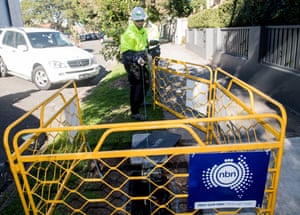When your objective is to provide an internet service that’s good enough just to download Netflix, there will be problems
(I'm working on uploading a video of Sock's match but on this Australian wifi it's going to take about an hour, bear with me y'all).
Now you might expect the government would be scrambling to explain what it is doing to improve the situation.
But you would be wrong.
Far from expressing concern, the minister for communications, senator Mitch Fifield, wrote an opinion piece for Fairfax newspapers essentially boasting about those numbers.
He claimed there was no failure because “given the choice, Australians have shown that 100Mbps speeds are not as important to them as keeping monthly internet bills affordable, when the services they are using typically don’t require those speeds” (Netflix was the service he cited).
Now you might think the fact that higher internet speeds are unaffordable for a majority of Australians is a problem. But again you would be wrong.
And it is all about policy objectives.
The government’s objective for the national broadband network was not to give Australians a world-class internet with speeds and prices equivalent or better than the rest of the world, which in turn would provide the country with infrastructure that would set us up for the next 100 years.
As the NBN’s own corporate plan puts it, “nbn’s key objective is to ensure all Australians have access to fast broadband as soon as possible, at affordable prices, and at least cost”.
But what is fast? Well, senator Fifield made it clear that it was 25Mps, as that was the speed recommended to download Netflix. He said “everyone will have access to speeds of at least 25Mbps” and “two-thirds of premises will have access to 100Mbps”.
When your objective is only to provide everyone with an internet that allows them to download Netflix, then that is what you deliver.
Policy objectives have long been a problem with the NBN.
The Labor party, for example, did wish to have the faster fibre to the home (FTTH) connections, but it too came with a caveat. Because the ALP was forever afraid of budget deficits, the NBN was set up to be eventually sold at a profit. As such it could be deemed an investment and spending on it was “off-budget”.
This led to pricing issues that have caused the price of top-end internet speeds to be out of reach for most people, and where internet service providers (ISPs) have in effect skimped on buying access from the NBN, which means your connection slows during peak times.
That may improve under a new pricing model the NBN has just released – which has already led to some ISPs reducing their prices.
The Australian Competition and Consumer Commission has also cracked down on how ISPs advertise their speeds. Last year, Telstra agreed to compensate 42,000 customers because the limitations on their connections “were not capable of receiving the maximum advertised speeds of the plans”.
That is why most ISPs now refer to “standard/typical evening speeds” rather than the maximum possible speed.
But in the end it still comes back to policy objectives.
If your objective is an internet that is good enough to download Netflix in 2018, you can ignore what the requirements will be in 10, 20 or 50 years’ time, and you can also overlook the crucial issues of upload speeds that are vital for businesses.
If your objective is also to somehow make a profit from it all, then you try to do it as cheaply as possible by using sub-par technology such as FTTN rather than FTTH or FTTC (to the curb), , and under a structure that has people being either unable to afford plans with faster speeds or to access them.
And then to justify your objective, you claim that being unable to afford something is a matter of “choice” and proof that faster speeds are not needed.
At present, the objective is to roll out the national broadband network as fast as possible and to upgrade to FTTH or FTTC - as a representative from NBN Co told a recent parliamentary committee – “as and when consumers are willing to pay more because they need higher speeds”.
But we now have a system where the unwillingness to pay more is viewed as evidence that the need is not there, so does anyone expect that upgrade to occur soon?
And we all know that increased need will happen – but it will come at greater cost because, in effect, we will do the same thing twice – the first time on the cheap and the second time properly.
It’s why there may be fixes around the edges – some better pricing plans, maybe less buffering – but until the actual objective of the NBN changes, it will continue to disappoint and remain a punch line.
- Greg Jericho is a Guardian Australia columnist

No comments:
Post a Comment